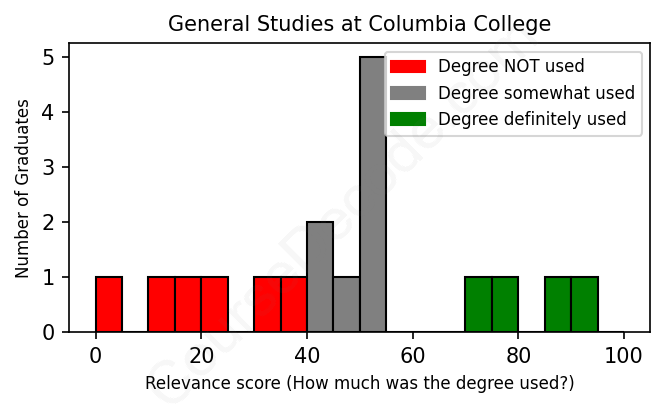
First, some facts. Of the General Studies graduates from Columbia College we've analyzed , here's how many have used (or NOT used) their degree in their career:

These are estimates based on AI analysis of 18 LinkedIn profiles (see below).
The verdict? Bad. Overall, with an average relevance score of 45%, General Studies graduates from Columbia College have a substantially lower likelihood (-22%) of finding work in this field compared to the average graduate across all fields:
And for comparison, here's the chart for all profiles we've looked at across all degrees.
Also, after graduating, only 22% of these graduates have pursued further education other than another Bachelor's degree (such as a Masters degree or other), compared to the average across all profiles of 35%. This suggests a Bachelors degree is enough for most General Studies graduates, and it's normal to look for work straight after graduation.
See the details:
|
Relevance score: 50% We think this person has gone into a career only somewhat relevant to their degree. We think this person has gone into a career only somewhat relevant to their degree.
DEGREE INFOGraduated in 2010 from Columbia College with a Bachelor of Arts (B.A.) in General Studies. No other secondary education since. JOB HISTORY SINCE GRADUATIONSubstitute Teacher Syracuse City School District Sep 2015 - Present ABOUTNo information provided. |
The top 10 most common jobs done by the graduates we've analyzed (ranked most common to least) are:
Looking at the career trajectories of people who graduated with a General Studies degree from Columbia College, it seems like a lot of them ended up in roles that are somewhat related, but not directly tied to what they studied. Common jobs include roles in customer service, project management, and education, like being a substitute teacher or a training coordinator. Many of these positions utilize skills such as communication, organization, and problem-solving, which are definitely valuable but don’t necessarily require specific knowledge from a General Studies degree. For instance, being a Customer Operations Manager may tap into some skills fostered through their coursework, but it's not a direct application of their degree content.
However, when you dig deeper, it becomes clearer that a lot of the jobs are more focused on practical skills and technical know-how rather than the academic knowledge gained in their programs. For example, roles like supply chain management and administrative positions often demand more hands-on experience and specific industry training. While some graduates find their way into teaching or roles that emphasize interpersonal skills, many seem to fall into jobs like truck driving or administrative assistance that don't require a college degree at all. So, while having a General Studies degree might help in some areas, many of these careers don't tap into the deeper academic benefits that the degree is supposed to provide.
Here is a visual representation of the most common words in job titles for General Studies graduates (this is across all General Studies graduates we've analyzed, not just those who went to Columbia College):

Looking at the career paths of graduates from Columbia College with a degree in General Studies, it seems like there's a mix of outcomes, but many folks find their footing in various sectors. Right after graduating, many of them often take on roles that are somewhat related to their studies or provide a stepping stone into different fields. For example, many started their careers in roles like administrative positions, teaching, or customer service, which give them a chance to develop essential skills. Over the first five years, several graduates have moved into more specialized or management roles, with many making a noticeable upward trajectory, particularly in fields like supply chain management, project coordination, and various customer-oriented positions.
Fast forward around 5 to 10 years, and you'd see some graduates becoming managers, technical specialists, or even launching their businesses. Some have managed to transition into roles that might not directly relate to their General Studies degree but capitalize on their diverse skill set. It’s a little hit-or-miss, though—while some have clearly succeeded and carved out careers in respected industries, others have taken on jobs that seem less connected to what they studied and might not be as fulfilling. Overall, it seems a degree in General Studies can open doors, but how far you go often depends on your initiative and the paths you choose early on.
Honestly, a Bachelor’s degree in General Studies can be pretty manageable, especially at a place like Columbia College, which tends to focus on a well-rounded education. You'll get to dabble in a variety of subjects, which means you won't be too bogged down by hardcore specialization. It’s designed for flexibility, so you can pick courses that interest you and fit your strengths. That said, like any degree, it still requires effort and commitment—it's not just a cakewalk. If you're someone who enjoys exploring different fields and is motivated to stay on top of your studies, you’ll likely find it easier than more specialized programs, but you’ll still have to put in the work to get that degree.
Most commonly, in the LinkedIn profiles we've looked at, it takes people 2 years to finish a Bachelor degree in General Studies.
Looking at these General Studies graduates from Columbia College, it seems like their earnings vary quite a bit. Some have landed solid positions, especially those at big companies like Pfizer and Abbott, where you can generally make a decent salary, especially as they climbed the ranks. On the flip side, you've got folks in roles like substitute teaching and truck driving, which typically don't pay as well. So, while some of these grads probably have a pretty comfortable income, others might be scraping by a bit more. Overall, it's a mixed bag, but there's definitely potential for good earnings depending on the path they've taken!
Here is a visual representation of the most common words seen in the "about" section of LinkedIn profiles who have a Bachelor degree in General Studies (this is across all General Studies graduates we've analyzed, not just those who went to Columbia College). This may or may not be useful:

Here are all colleges offering a Bachelor degree in General Studies (ordered by the average relevance score of their General Studies graduates, best to worst) where we have analyzed at least 10 of their graduates:
| College | Score | Count |
|---|---|---|
 Southeastern Louisiana University Southeastern Louisiana University
|
69 | 10 |
 University of Louisiana at Lafayette University of Louisiana at Lafayette
|
62 | 16 |
 Western Illinois University Western Illinois University
|
59 | 10 |
 Eastern Illinois University Eastern Illinois University
|
59 | 12 |
 University of North Texas University of North Texas
|
58 | 14 |
 Eastern Kentucky University Eastern Kentucky University
|
57 | 13 |
 University of Central Oklahoma University of Central Oklahoma
|
55 | 15 |
 Texas Woman's University Texas Woman's University
|
53 | 10 |
 Southern New Hampshire University Southern New Hampshire University
|
52 | 17 |
 Columbia College Columbia College
|
45 | 18 |
 Ball State University Ball State University
|
34 | 11 |